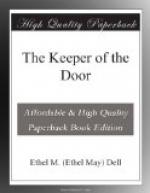Noel screwed up his Irish eyes and laughed. “In twelve years or thereabouts.”
“Oh!” A pair of wide blue eyes regarded him attentively. “Twelve years is a very long time,” observed the chief bridesmaid gravely.
“It is, isn’t it?” said Noel, with a large sigh.
“P’raps you’ll be dead then,” suggested the chief bridesmaid.
“What a jolly idea! P’raps I shall. In that case, the marriage will not take place.”
She sat down on his knee, and slipped a kindly arm round his neck. “I hope you won’t be dead, Noel,” she said, in the careful tone of one not wishing to be taken too seriously.
The best man smiled all over his merry face. “I shall do my best to survive for your sake,” he said.
She nodded thoughtfully. “But why aren’t you goin’ to get married sooner?”
He surveyed her with his head on one side. “My little sweetheart is only pocket size at present,” he said. “I’m waiting for her to grow up.”
“Oh! Is she little like me?” asked the chief bridesmaid, looking slightly disappointed.
“She’s just like you, sweetheart,” said Noel, with cheery assurance. “She has eyes of wedgewood blue, and hair of golden down, a mouth like a rose, and the jolliest little turn-up nose in the world. And she’s going to be six next birthday.”
This classic description was an instant revelation to the chief bridesmaid. She blushed very sweetly, with pleasure unfeigned in which shyness had no part. “Oh, Noel!” she breathed, in rapturous anticipation. “But why must we wait till we’re growed up?”
“We!” said Noel, who was twenty-two and a crack shot in the Regiment.
She kissed him propitiatingly. “I mean—dear Noel—. why can’t we go and get married now? I’m sure Mummy wouldn’t mind.”
“H’m! I wonder!” said Noel.
“I do love you so very much,” said the chief bridesmaid, with eyes of shining sincerity. “And you are just the beautifullest soldier I ever saw!”
He threw back his head in a laugh that showed his white teeth, to his small adorer’s huge delight. He was certainly a very gallant figure in his red and gold uniform with his sword dangling at his side; and his winning Irish ways gained him popularity wherever he went.
It was true that the chief bridesmaid’s mother shook her head at him, and called him fickle, but then his fickleness was of so open and boyish an order that it could hardly be regarded as a fault, especially since no one—with the exception of the chief bridesmaid—ever took him seriously. And to her at least young Noel Wyndham was always tenderly faithful in his allegiance.
On the present occasion, though nominally he had been acting as best man to a brother officer, he had spent most of his time in the service of the muslin-frocked, bare-legged atom who now sprawled upon his knee with all the privilege of old acquaintance, assuring him of her whole-hearted devotion and admiration.




